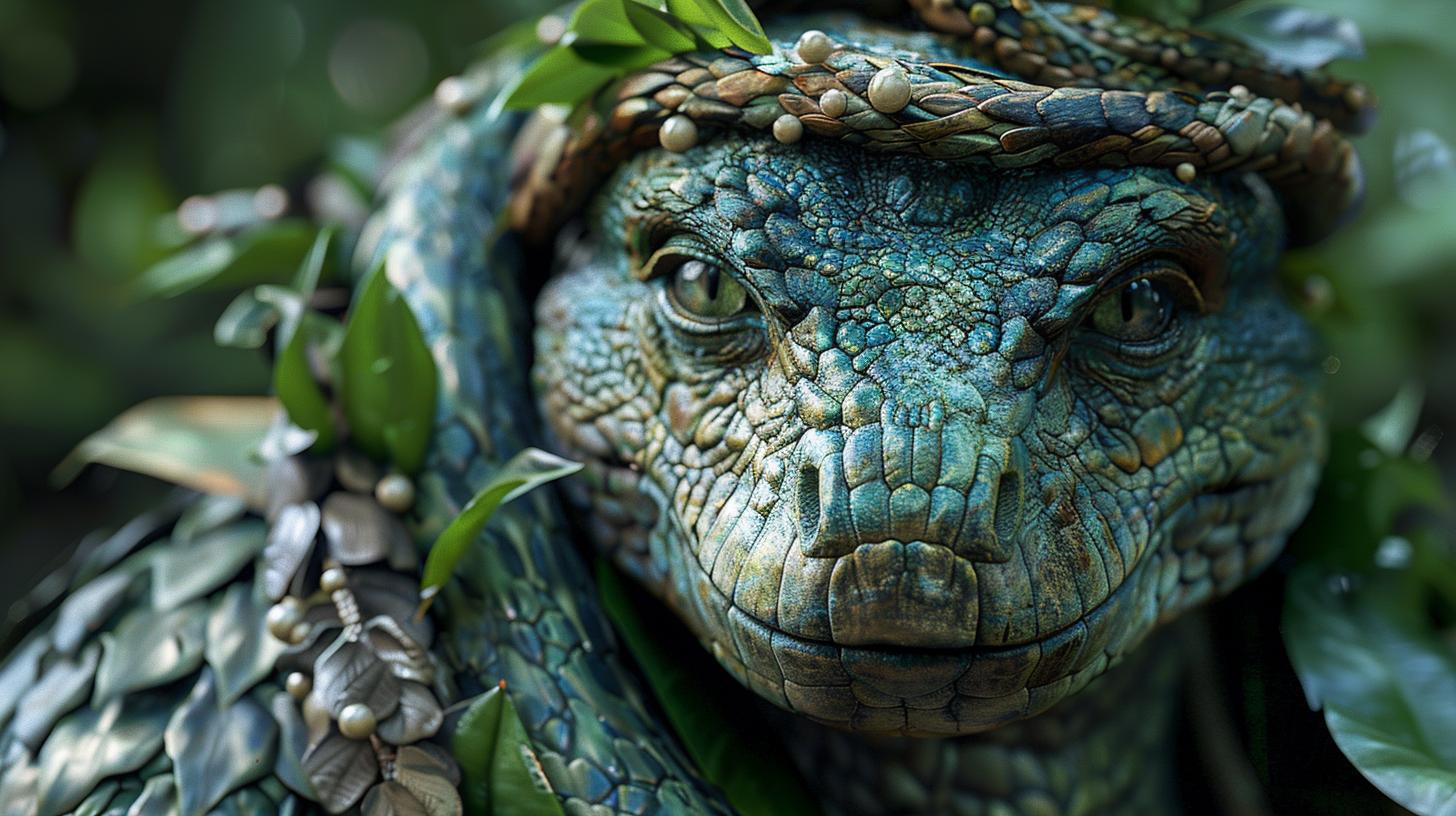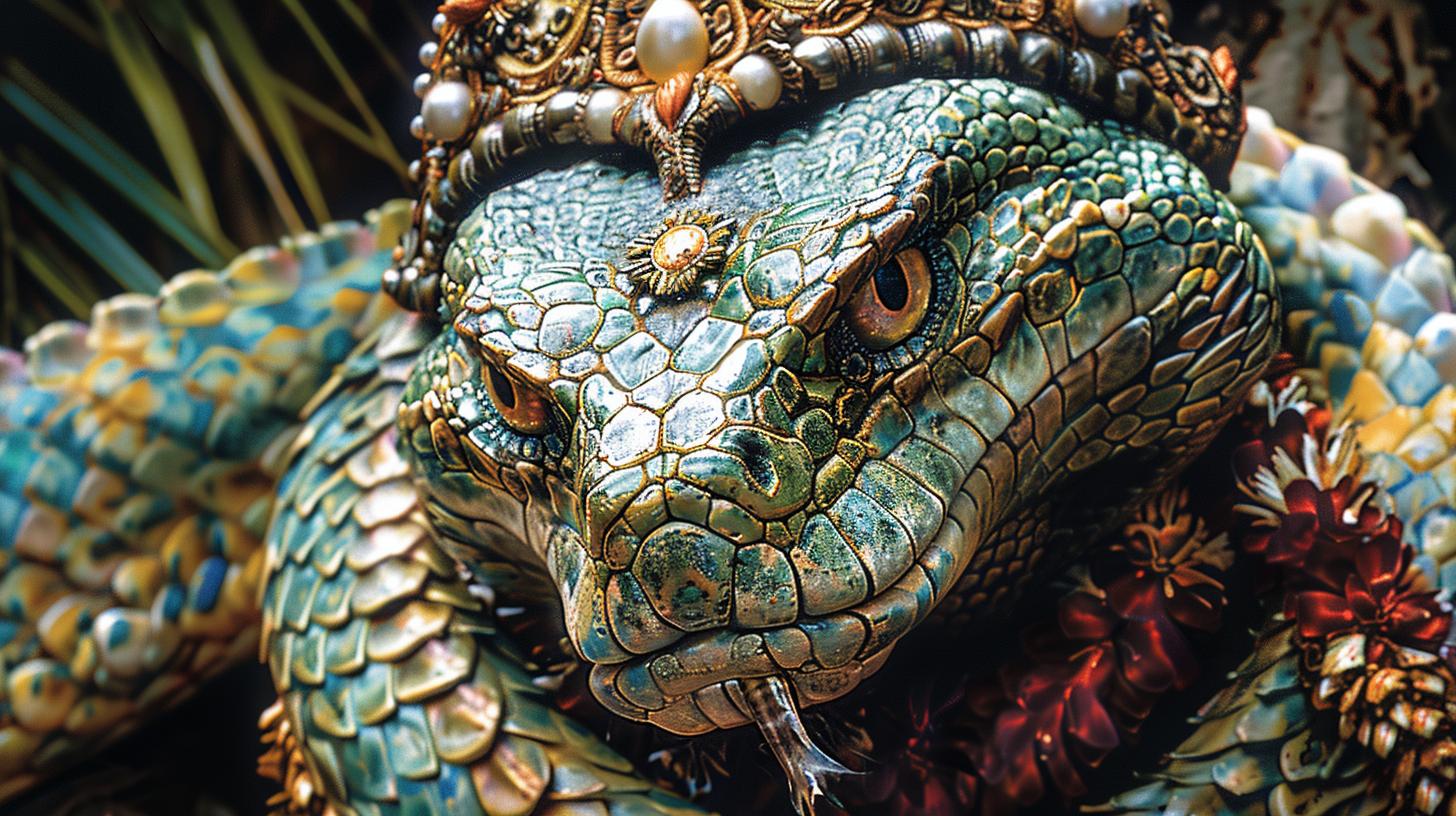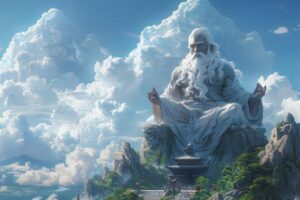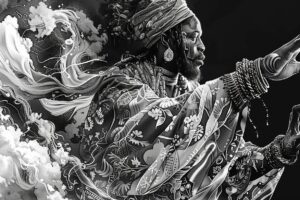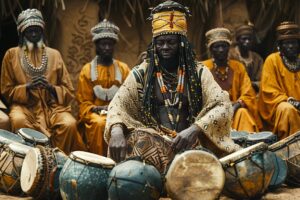Degei The Snake God: A Legendary Figure from Fijian Mythology
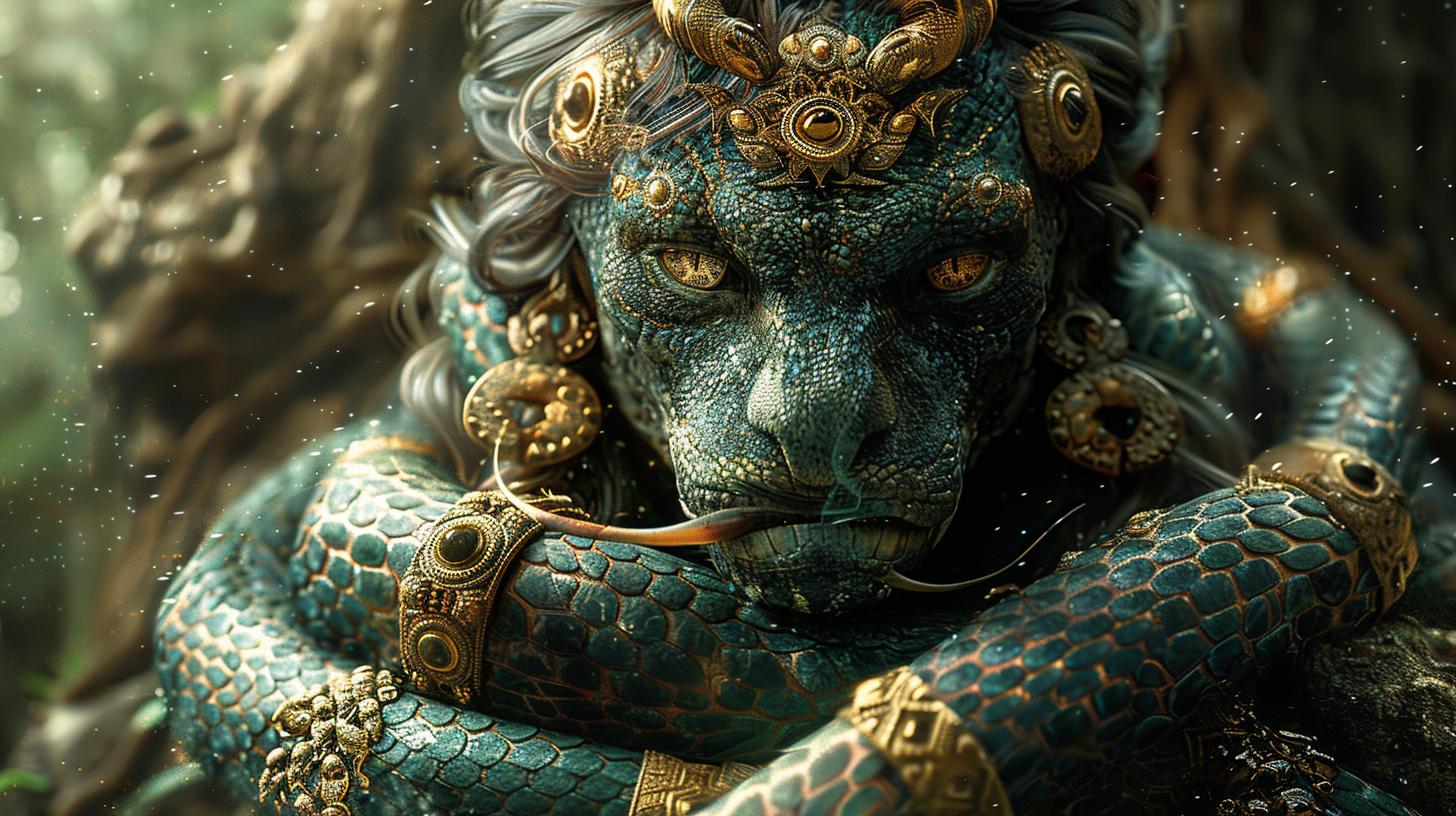
Degei The Snake God is a significant deity in Fijian mythology, believed to be the first living god who created humans and ruled over Fiji. Degei’s story intertwines with the creation of humans, teachings to the first humans, and a unique relationship with Turukawa.
This article explores Degei’s role as the supreme god of Fiji, his departure, and his ongoing cultural legacy, showcasing the benevolent nature of the snake deity in Fijian folklore and its symbolic significance globally.
Degei The Snake God in Fijian Mythology
Origins of Degei
The origins of Degei, the Snake God in Fijian mythology, are shrouded in mystery and ancient folklore. Degei is believed to be the first living god who played a significant role in the creation and shaping of the world.
Creation of Humans by Degei
Degei’s creation of humans is a fundamental aspect of Fijian mythology. According to legend, Degei crafted the first humans from eggs and nurtured them into existence, imparting them with the knowledge of life and nature.
Degei’s Teachings to the First Humans
As the supreme god of Fiji, Degei bestowed wisdom upon the first humans, guiding them on how to survive and thrive in the world. His teachings encompassed the secrets of the natural world, the importance of harmony with nature, and the reverence for all living beings.
Degei’s Relationship with Turukawa
Degei’s unique bond with Turukawa, the female hawk, was integral to the beginnings of civilization in Fiji. Turukawa, a silent and majestic presence, played a crucial role in the origin story of Degei and the creation of the first human beings.
Together, Degei and Turukawa embarked on a journey of creation and guidance, as Turukawa’s silent wisdom complemented Degei’s divine power. The partnership between the snake god and the hawk symbolized a harmony between land and sky, primal forces that shaped the destiny of Fiji.
As a deity of immense power and wisdom, Degei is believed to have shaped the destiny of the first humans and imparted essential knowledge for their survival and development.
- Degei’s Authority and Leadership
- Degei’s Influence on Creation
- Degei’s Judgment and Wisdom
As the ruler of Fiji’s spiritual realm, Degei’s authority extends over all aspects of life, guiding the fate of both mortals and immortals.
His leadership is characterized by benevolence and a deep connection to the natural world, shaping the spiritual landscape of the islands.
Through his divine power, Degei orchestrated the creation of the islands of Fiji and the intricate tapestry of life that thrives within its boundaries.
His role as the Supreme God underscores his significance in the cosmic order and the genesis of existence.
As the guardian of souls and arbiter of destinies, Degei’s judgment holds immense weight in the afterlife of individuals.
His wisdom transcends human comprehension, offering insights into the mysteries of existence and the cyclical nature of life and death.
The First Humans and Degei
Degei, the revered Snake God of Fijian mythology, played a pivotal role in the creation of the first humans in the world according to Fijian lore. Let’s delve into the details of this intriguing narrative.
The Food Prohibition Imposed by Degei
Degei, in his wisdom, set a strict prohibition on what the first humans could eat. He provided them with abundant resources, including the bountiful tree of bananas. However, the consumption of certain foods was forbidden, as the art of fire was yet to be revealed.
Forbidden Foods:
- Dalo (Taro)
- Yams (Sweet Potatoes)
These foods were reserved for the gods, creating a clear distinction between what was permissible for humans to consume and what was meant for the divine.
Teaching of Fire Usage to the First Humans
The benevolent deity imparted the secret of fire usage to them, enabling the cooking of previously prohibited foods like dalo and yams.
Gift of Fire:
- Enabled cooking of diverse foods
- Expanded dietary options for early humans
This momentous revelation marked a significant advancement in the development of human civilization, showcasing Degei’s nurturing and instructive nature towards his creations.
Degei’s Departure and Legacy
After imparting crucial knowledge to the first humans, Degei eventually departed from their midst, leaving them to traverse their own paths. As Degei withdrew, the humans were entrusted with carrying forward the teachings and wisdom bestowed upon them.
His departure marked a pivotal moment in the journey of the early humans, as they now had to navigate the world with the acquired knowledge of fire usage and the understanding of the prohibited food sources.
- The legacy left by Degei continued to shape the way the early humans interacted with nature and understood their connection to the divine. His departure symbolized a transition from direct guidance to self-reliance, with the humans tasked to uphold the lessons learned from their divine progenitor.
- Through Degei’s departure, a sense of responsibility was instilled in the first humans to honor their creator by maintaining the balance of nature and respecting the boundaries set by the gods.
The legacy of Degei lived on through the stories passed down from generation to generation, solidifying his place as a revered deity in Fijian mythology.
Degei’s Landing Site in Lautoka
It is said that Degei, the revered Snake God of Fiji, made his first landing in Lautoka, where he founded the village of Viseisei.
This significant site marks the initial arrival of Degei and is considered a sacred location in Fijian folklore. The presence of Degei in Lautoka holds deep cultural and spiritual importance for the local community.
Legend has it that Degei’s choice to establish Viseisei in Lautoka solidified the connection between the people of Fiji and their divine creator. The landing site serves as a reminder of Degei’s benevolent influence and his role as the supreme deity in Fijian mythology.
The legacy of Degei’s presence in Lautoka continues to resonate within the hearts and minds of the Fijian people to this day.
Comparison of Degei with Hindu Serpent Deities
Degei, the Snake God of Fijian mythology, shares intriguing similarities with Hindu serpent deities, particularly in their roles within the respective mythologies. While Degei is portrayed as a benevolent and creator god, the Hindu serpent deities often exhibit complex characteristics that may include both positive and negative attributes.
This remote and sacred site is shrouded in mystery and holds significance in Fijian folklore and cultural narratives. The cave in Nakavadra is veiled in whispers of ancient tales, where the presence of Degei, the Snake God, is said to still linger, resonating with the spirits of the land.
The enduring mythical connection between Degei and the rugged terrain of Viti Levu adds depth to the spiritual heritage of Fiji, entwining the deity with the natural splendor of the island’s landscape.
The revered location serves as a testament to the enduring legacy of Degei and his mythical presence within the hearts and minds of the Fijian people.
Concept of the Snake God across Different Mythologies
Snake deities are prevalent across various mythologies worldwide, often symbolizing different aspects of nature, spirituality, and power.
While Degei stands as a benevolent snake god in Fijian folklore, other cultures depict serpent deities with diverse characteristics and roles.
- In Hindu mythology, the serpent Kaliya represents malevolence and chaos, in contrast to Degei’s positive attributes.
- Ancient Egyptian mythology features the deity Wadjet, associated with protection and royalty, embodying the snake as a guardian figure.
- In Norse mythology, the Midgard Serpent Jormungandr symbolizes the cyclical nature of life and destruction, showcasing the multifaceted interpretations of serpent deities.
Throughout history, snake gods have been revered and feared, reflecting humanity’s complex relationship with these creatures as symbols of creation, wisdom, and transformation.
By exploring the varied representations of snake deities across different mythologies, we gain insight into the universal themes of life, death, and rebirth intertwined with serpent symbolism.
Degei’s Representation as a Benevolent Deity
Degei, the Snake God, is known in Fijian mythology for his benevolent nature and care towards humankind.
Unlike serpent deities in other mythologies, Degei is portrayed as a kind and nurturing figure, guiding the first humans with wisdom and compassion.
- He is revered as a protector and provider, ensuring the well-being of his creations.
- Degei’s teachings emphasize harmony with nature and the importance of respecting the gifts of the earth.
- His role as a benevolent deity showcases a different perspective on serpent symbolism, highlighting the positive attributes associated with snakes in Fijian culture.
Symbolism and Significance of Degei in Fijian Culture
In Fijian culture, Degei holds a profound symbolism and significance, representing not only the creator of humans and the islands but also the guardian of life and judge of souls.
As the benevolent snake god, Degei embodies wisdom, protection, and the cycle of life and death. His association with nature and creation underscores the interconnectedness of all living beings with the divine.
- Degei’s presence in Fijian mythology reflects a deep reverence for the natural world and the spiritual realm, emphasizing the importance of harmony and respect for the forces that govern life.
- The serpent imagery of Degei represents transformation, rebirth, and regeneration, symbolizing the eternal cycle of existence and the continual renewal of the soul.
- Degei’s role as the supreme god of Fiji highlights his authority and benevolence, guiding the destinies of humans and overseeing the balance between the earthly and divine realms.
Exploration of Serpent and Snake Imagery in World Mythology
Throughout various mythologies around the world, serpents and snakes hold deep symbolic significance.
These creatures are often associated with concepts such as creation, transformation, and rebirth. In many cultures, snakes are seen as intermediaries between the earthly realm and the divine, representing wisdom, healing, and protection.
In Egyptian mythology, the god Ra is often depicted as a snake, symbolizing the cyclical nature of life and eternity. In Greek mythology, the serpent-like creature known as the Hydra embodies the idea of regeneration and the overcoming of challenges.
Similarly, in Norse mythology, the serpent Jormungandr encircling the world symbolizes the interconnectedness of all things.
- In Hindu mythology, snakes are revered as symbols of fertility and cosmic energy, with the serpent god Shesha supporting and carrying the weight of the universe.
- In Mesoamerican cultures, the feathered serpent Quetzalcoatl represents both the creative force of life and the transformative power of death and rebirth.
Overall, the prevalence of serpent and snake imagery in world mythology underscores the universal themes of creation, destruction, and renewal that these enigmatic creatures embody across diverse cultural contexts.
Snake deities hold significant mythological importance across various cultures and religions worldwide, often symbolizing both positive and negative attributes. In mythological narratives, serpent figures are commonly associated with themes of creation, wisdom, fertility, and transformation.
The serpent’s shedding of its skin is often linked to themes of renewal and rebirth, symbolizing cycles of life and death.
- Snake deities are frequently depicted as guardians of sacred spaces or as intermediaries between the earthly realm and the spiritual world.
- In certain belief systems, serpent deities are revered as protectors of hidden knowledge or as bringers of enlightenment, guiding individuals towards spiritual awakening.
- Across diverse mythologies, the serpent is a complex symbol representing dualities such as good and evil, life and death, and the eternal cycle of existence.
Furthermore, serpent deities are often associated with the natural world, embodying the primal forces of nature and the interconnectedness of all living beings.
Their presence in mythological narratives serves to emphasize the intricate relationship between humanity and the environment, highlighting the reverence for nature and the essential balance of the cosmos.
Snake Gods in Ancient Civilizations
Throughout ancient civilizations, serpent deities held significant roles in mythology and religious practices.
These revered beings were often associated with creation, fertility, and protection, symbolizing power and wisdom across diverse cultures.
- In Mesopotamian mythology, the serpent god Ningishzida was worshipped as a guardian of fertility and agriculture, embodying the cycle of life and death.
- Ancient Egyptian culture revered the deity Apep, a serpent god representing chaos and destruction, whose defeat ensured the continuity of the universe.
- Greek mythology featured the serpent-like creature Python, slain by the god Apollo, symbolizing the triumph of light over darkness and order over chaos.
- The Aztec civilization honored Quetzalcoatl, a feathered serpent god associated with wind, fertility, and Venus, embodying the dual nature of creation and destruction.
These snake gods played integral roles in ancient belief systems, influencing rituals, cosmology, and societal norms, while embodying the complexities of human existence and the mysteries of the natural world.
Degei’s Association with Nature and Creation
Degei’s connection to nature and creation resonates deeply within Fijian mythology. Through his actions, the natural world became intertwined with the divine, reflecting a symbiotic relationship between the god and the earthly realm.
- His influence on the land is evident in the flourishing vegetation that surrounds his dwelling, teeming with life and abundance.
- Degei’s role in shaping the landscape and nurturing the first humans highlights his status as a revered deity who harmonizes with the elements.
- The intricate balance of nature mirrors Degei’s own demeanor, characterized by wisdom and benevolence towards all living beings.
As the embodiment of creation and fertility, Degei’s presence underscores the interconnectedness of all living things, fostering a sense of unity and reverence for the natural world.
Degei’s Influence on Fijian Folklore
Degei’s presence in Fijian folklore transcends mere myths to embody a lasting cultural and spiritual significance. As the benevolent Snake God woven into the fabric of Fijian beliefs, Degei serves as a symbol of creation, wisdom, and divine protection.
- The tales of Degei’s teachings to the first humans underscore his role as a divine mentor, imparting essential knowledge and fostering a harmonious relationship between humans and nature.
- His association with the natural world and the act of creation showcases Degei as a revered deity revered for his nurturing and guiding presence.
- Degei’s legacy continues to shape Fijian traditions, rituals, and values, preserving the rich tapestry of folklore that honors the sacred connection between humanity and the divine.
The Cultural Impact of Degei’s Story
Degei’s story has had a profound cultural impact on the Fijian people, shaping their beliefs, traditions, and way of life over the centuries.
The myth of Degei as the benevolent snake god who created humans and imparted knowledge has been passed down through generations, becoming an integral part of Fijian folklore.
- The portrayal of Degei as a caring and wise deity has influenced Fijian values, emphasizing the importance of knowledge, harmony with nature, and respect for spiritual beings.
- Degei’s teachings to the first humans symbolize the sacred bond between humans and the divine, underscoring the interconnectedness of all living beings and the significance of guidance from higher powers.
- Through Degei’s role as the supreme god of Fiji and his association with creation and the natural world, Fijians have derived a sense of identity, purpose, and reverence for their cultural heritage.
- The symbolism of the serpent deity Degei resonates deeply in Fijian art, music, and rituals, serving as a source of inspiration and spiritual guidance for the community.
The Serpent as a Symbol in Global Mythology
In myths from various cultures around the world, the serpent holds a symbolic significance that transcends geographical boundaries.
Its ability to shed its skin is often viewed as a metaphor for rebirth and transformation.
- The Ancient Egyptians revered the serpent as a symbol of royalty and protection, often depicting the cobra on the crown of pharaohs.
- In Norse mythology, the serpent Jormungandr encircles the world, representing the cyclical nature of life and the eternal struggle between order and chaos.
- Chinese mythology features the dragon, a serpent-like creature associated with power, strength, and good fortune.
- Among Native American tribes, the serpent is seen as a guardian of sacred knowledge and a mediator between the earthly and spiritual realms.
Across cultures, the serpent’s presence in mythology underscores its symbolic depth and universal resonance, highlighting its role as a potent symbol that transcends cultural boundaries and speaks to fundamental aspects of the human experience.
Interpretations of Serpent Deities in Different Cultures
Throughout diverse cultures, serpent deities hold significant roles and symbolisms. These divine figures are often associated with themes of creation, rebirth, and wisdom, showcasing a range of interpretations across various mythologies.
- In Mesopotamian culture, the serpent was linked to deities like Ningishzida, symbolizing fertility and the cycle of life.
- Ancient Egyptian mythology portrays the goddess Wadjet, who took the form of a cobra and represented protection and royalty.
- Within Aztec beliefs, Quetzalcoatl was revered as a feathered serpent deity, embodying knowledge, wind, and the planet Venus.
- Hinduism features the serpent gods Vasuki and Ananta, associated with timelessness and cosmic balance.
These varied interpretations of serpent deities reflect the universal fascination with these creatures, highlighting their rich symbolism and cultural significance across different belief systems.
Degei’s Representation in Popular Culture
Degei, the revered Snake God from Fijian mythology, has left a lasting imprint on popular culture. His depiction as a benevolent deity with a strong connection to creation and nature has captured the imagination of many artists, writers, and filmmakers.
- Artists often incorporate Degei’s serpentine form into their works, symbolizing wisdom, power, and eternal life.
- Writers draw inspiration from Degei’s story to create compelling narratives of creation, divine intervention, and the relationship between gods and mortals.
- Filmmakers have explored Degei’s myth in various cinematic interpretations, showcasing his role as a catalyst for change and growth.
From paintings to literature to movies, Degei’s presence in popular culture serves as a reminder of the enduring appeal of mythological tales and the profound impact they have on artistic expression and storytelling.
Legacy and Continuation of Degei’s Myth in Modern Times
The enduring legacy of Degei The Snake God in Fijian culture continues to fascinate and captivate both locals and visitors alike. His mythical presence permeates various aspects of modern Fijian life, from art and literature to traditional ceremonies and cultural practices.
The tale of Degei’s creation of humans and his teachings to the first inhabitants of Fiji still resonates today, serving as a reminder of the rich folklore and heritage of the island.
- Degei’s myth remains a central theme in Fijian storytelling, passed down through generations to preserve the ancient traditions and beliefs of the indigenous people.
- Artistic representations of Degei can be found in contemporary Fijian artwork, depicting the snake deity in a variety of interpretations that reflect the cultural significance of his legacy.
- The concept of Degei as a benevolent god and creator figure continues to inspire reverence and devotion among those who uphold the traditional values and spiritual beliefs associated with his myth.
.

